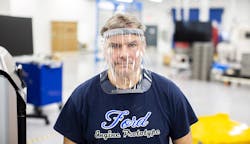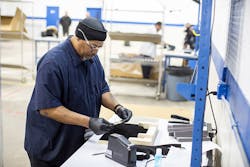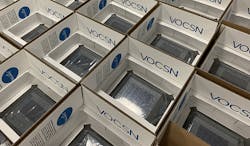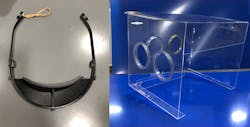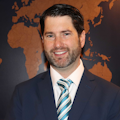One of the most heartbreaking aspects of the COVID-19 pandemic is reading healthcare workers’ social media posts on the lack of adequate personal protective equipment. Like truckers, they are this war’s frontline warriors and need to be put in the best position to come home safe because A) we owe them that much; and B) they need to remain healthy to help those who aren’t.
As they have in previously dire times, such as World War II, America’s automotive and trucking OEMs and equipment manufacturers have answered the call for help. Instead of tanks and bullets, this time the new munitions are masks and ventilators.
And their manufacturing prowess has been impressive. While some have been at home gaming and playing "Fortnite" to pass the time, Ford’s UAW members have churned out one million face shields in less than a fortnight (13 days). The facial protection, produced at the Troy Design and Manufacturing’s facilities in Plymouth, Mich., is vital to maintaining a barrier between COVID-19 patients and medical workers.
At least 75,000 units have been delivered to Detroit-area hospitals, one of the country’s outbreak hotspots. Michigan’s government reported 845 deaths in the state and more than 17,000 confirmed cases.
The company, which suspended its traditional automaking operations, has also teamed with 3M to make Powered Air-Purifying Respirators (PAPRs), reallocating fans from F-150 cooled seats in the design.
A plan to manufacture scaled-down versions of GE Healthcare ventilators at Ford’s Rawsonville Components plant and GE sites is also being explored.
The Advanced Manufacturing Center in Redford, Mich., has also joined the effort, lending its array of 3D-printing technology to quickly produce PPE sub-assemblies.
“This is such a critical time for America and the world. It is a time for action and cooperation. By coming together across multiple industries, we can make a real difference for people in need and for those on the front lines of this crisis,” said Bill Ford, Ford’s executive chairman. “At Ford, we feel a deep obligation to step up and contribute in times of need, just as we always have through the 117-year history of our company.”
"What's driving us is the unending demand on the front lines for this equipment from the hospitals and first responders all around the country and here in the Detroit area," relayed home-bound Marcy Fisher, director of global body exterior and interior engineering at Ford, to The Detroit Free Press. "I feel like there's more desperation in their requests this week than even last week."
Fiat Chrysler Automobiles (FCA) announced on March 23 that it would make and donate more than 1 million face masks per month, which would be made at a converted Chinese plant, with the gear going to first responders and healthcare workers. On April 1, Gov. Gretchen Whitmer tweeted that FCA’s Mopar Parts Distribution Center shipped about 500,000 face masks to the greater Detroit metropolitan area.
In Italy, the hardest hit European nation, the OEM teamed with Ferrari to assist Siare Engineering International Group in producing that company’s ventilators.
Of the Big 3, General Motors was the only one called out by President Donald Trump (who implored them to reopen the Lordstown, Ohio, plant that was sold to an electric pickup startup) to make ventilators. He then invoked the Defense Production Act to compel the business to comply on March 27. GM contended that they were already working with Ventec Life Systems to that end.
These VOCSN critical-care ventilators require 700 different parts, and GM developed a supply chain plan with Ventec to make 200,000.
GM CEO Mary Barra said the ventilators are being made at Kokomo, Ind., facility and Level 1 surgical masks at the Warren, Mich., site, which will scale to 100,000 units a day.
“Without question, COVID-19 is real, it’s dangerous and it has turned our world upside down,” Barra wrote in a LinkedIn post. “But I hope that when the world goes back to right-side up, we remember what is possible when we focus our collective energy at the scale we are doing today.”
After some reluctance on its CEO Elon Musk’s part to acknowledge the potential severity of the coronavirus, Tesla has stepped up to make ventilators primarily using car parts ranging from manifolds to infotainment computer boards — as to not deprive the medical manufacturing supply chain of needed materials.
Tesla reportedly delivered 1,000 ventilators so far, with 300 going to Detroit. Musk also bought more than 1,200 ventilators from China and gave them to California hospitals, a truckload of PPE to the University of California, Los Angeles, and provided 50,000 N95 masks to the University of Washington School of Medicine.
Equipment suppliers
On the equipment side, Dana Inc., which provides drivetrain and e-propulsion systems to the trucking industry, has also employed 3D printers at its Advanced Manufacturing Center in Maumee, Ohio, to fabricate face shield components.
“At Dana, safety is our first and highest priority, and we are honored to provide equipment that will help protect the medical professionals and first responders on the front lines working to help keep our colleagues, their families, and our communities safe,” said Ryan Laskey, vice president for Dana Commercial Vehicle engineering. “The spirit of the Dana team is echoed in our motto — 'People Finding a Better Way’ — and when our team understood the need for these items they went into action to find ways we could redeploy our people and assets to lend our hand in the fight against the COVID-19 pandemic.”
The engineering team runs 10 industrial 3D printers, including new equipment from Stratasys and Markforged, to make the parts, which are then combined with pieces sourced from other local companies for assembly. The collaboration creates about 70 masks per day.
Dana personnel also designed Plexiglas intubation boxes to allow medical staff to treat patients with an extra layer of protection. Lucas County, were Maumee is located, had 353 cases as of April 7, but there are concerns that overflow patients from Detroit — an hour away — might end up in the Toledo-area hospital system.
Cummins has also donated NanoNet and NanoForce Media technology, used in air and lube filtration, to the University of Minnesota to create a prototype N95 respirator mask for the Minneapolis-area healthcare system. Initial testing found the material "exceeded the performance requirements for N95 designation," according to Cummins Filtration.
“The first thing we recognized from our experts in the Center for Filtration Research, who work directly with Cummins, is that not all filtration materials are created equal and that the Cummins material is an excellent alternative,” said Jakub Tolar, Campus Health Officer and Medical School Dean at the University of Minnesota.
The National Institute for Occupational Safety and Health (NIOSH)still needs to vet the new mask design, which would be made open-source so other organizations could produce the masks as well.
“We’re working as quickly as possible with healthcare regulators and other partners to help certify products with our materials, and prepare our manufacturing facilities to meet demand,” said Amy Davis, Vice President of Cummins Filtration.
About the Author
John Hitch
Editor
John Hitch is the editor-in-chief of Fleet Maintenance, providing maintenance management and technicians with the the latest information on the tools and strategies to keep their fleets' commercial vehicles moving. He is based out of Cleveland, Ohio, and was previously senior editor for FleetOwner. He previously wrote about manufacturing and advanced technology for IndustryWeek and New Equipment Digest.
